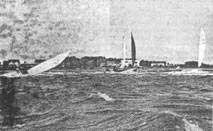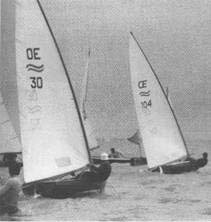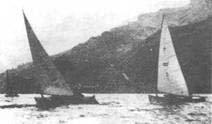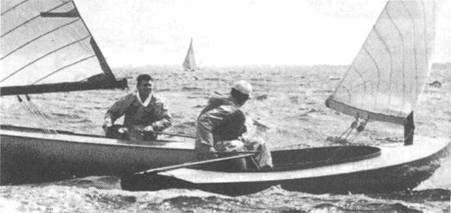| 28. History of the Senior European Championship |
by Peter Mohilla and Robert Deaves |
|
At the time that the Finn became the Olympic singlehander in 1952, the IYRU used to delegate the organisation of a European Championship with a crew of one to member countries. They had the freedom to select a suitable class for the event. In those days it was customary - as it was in the Olympic Games until 1996 - that the host country supplied the boats for the European Championship and that each country is allowed to enter only one sailor.
The sailors had to qualify in a local class and then adjust to the class the host country selected and the individual boat which was assigned to them each day. Before 1954 the event was generally sailed in the O-Jolle and won by sailors unknown in the Finn class.
The 1954 IYRU European Championship for a crew of one was delegated to the Federal Republic of Germany and organised again in the 1936 O-Jolle in Berlin on the Wannsee. Interesting for us is the fact that the people who were fast in the Finn were also representing their countries in that event. The favourite, Paul Elvstrom, won four races but had so many collisions in others that he finally ended up only 4th. The Championship was won by Andre Nelis - silver medalist in the 1956 Olympics - without winning a single race. The silver medalist of the 1936 Olympics Werner Krogmann was second and Rickard Sarby was third.
In 1955 the Championship was delegated to Austria and the O-Jolle was selected again for the races organised on Lake Traunsee. There were 11 races with generally very little wind. The Austrian Wolfgang Erndl became the European Champion. The Finn sailor Jan de Jong from Holland was third, Andre Nelis 6th, Vernon Stratton 8th and Rickard Sarby 12th after he had left the regatta because of the poor wind conditions.
1. European Championship 1956
Loosdrechter Lakes, Holland, August 20-25, 15 entries from 15 countries.
|
Belgium should have organised the IYRU European Championship for a crew of one. However because there was no suitable sailing area the Belgians gave the organisation to the Dutch. They in turn selected a totally unsuitable sailing area themselves, although they have such fine areas. The selected site was a former peat bog near Loosdrecht with very shallow water and hundreds of little islands left over from the peat-cutting. In addition the water was crowded with about 1000 recreational spectator boats and the little islands were heavily wooded. The competitors never saw the next mark and had to decide which of the various narrows between the basins might turn out to be the most advantageous.
However for the history of the Finn it is important that the Dutch selected for the first time the Finn Dinghy for that European Championship and provided 15 cold moulded boats, not all of which had self-bailers and buoyancy bags. There were very variable wind conditions so it heavily depended on the lot the sailors drew each day. Because of the unsuitable site Elvstrom refused to participate. The first European Champion of the Finn Class was Jurgen Vogler from the German Democratic Republic; the runner up was the Frenchman Didier Poissant, and Andre Nelis was third. In 7th place was Rickard Sarby, and in 11th Curd Ochwadt the promoter of the Finn Class in the Federal Republic of Germany. Also, at this European Championship the IFA was finally founded and had its first Annual General Meeting.
|
 |
|
2. European Championship 1957
Naples, Italy, August 27-September 3, 12 entries from 12 countries.
The Italians selected the Finn again and provided 12 very nice brand new boats, all well and equally equipped. Racing was in Naples Bay - site of the 1960 Olympic regatta. There were 16 races scheduled, of which 10 were finally sailed. Winds were generally light and taking advantage of the tide was quite important. Andre Nelis won 8 races and became the superior winner. The battle for the runner-up was tight between Pelaschier, Vogler, and Schwarz. Sweden was represented by the nephew of Rickard Sarby, Bert Sarby.
|
3. European Championship 1958
Cascais, Portugal, September 3-7, 12 entries from 12 countries.
No country was particularly interested in being entrusted by the IYRU with the organisation of the 1958 European Championship. Finally Portugal accepted without ambition, lacking experience in the Finn. For the first time, the organiser invited the participants to bring their own boats in order to save the costs in building new ones. Four sailors brought their own dinghies and had a large advantage. The 8 new boats supplied by the organiser had never been sailed before and were inferior. An additional problem was the launching facilities. A crane lowered and lifted the boats with the skipper on board from a 20 m high quay. So this Championship was more a test of technical skills than of sailing abilities.
|
 |
|
4. European Championship 1959
Silsersee, Switzerland, August 27-30, 18 entries from 18 countries.
For 1959 the IYRU delegated the event to Switzerland. Although this country even today still has a strong O-Jolle fleet, the Finn was selected since it was the designated singlehander for the 1960 Olympics. The Swiss choose the Silsersee south of St. Moritz with usually strong winds, where however they had never before organised a sailing regatta. The 52 year old Dutchman Jan de Jong, 1.95 m tall, weighing 100 kg, but quick as a flash and smart, won four races and was twice runner- up. In second overall, the Frenchman Pinaud, had a number of new technical gadgets on his Finn. The German Democratic Republic sent J. Vogler who came third and had won the Gold Cup before. Fourth was Kuhweide, at that time only 16 years old.
|
 |
5. European Championship 1960
Ostende, Belgium, July or early August, 10 entries from 10 countries.
Four races between force 4 and 7 suited Paul Elvstrom perfectly and he won three of the races. 17 year old newcomer from the Federal Republic of Germany Willy Kuhweide won the first race, but scored never worse than 4th, and thus became runner-up. Host Andre Nelis won two races, but did not perform that well in the heavy wind and had a collision in the sixth race. In the fourth race, when it blew force 7, it is reported that Elvstrom in first and Kuhweide in second position did not dare to gybe. However Nelis in third position risked the manoeuvre, made it technically, but hit the mark, got entangled with the French Pinaud and lost several hundred meters. |
 |
|
6. European Championship 1961
Warnemunde, German Democratic Republic,
July 14-18, 14 entries from 14 countries.
In splendid racing conditions seven races were sailed without a discard. After each race the overall lead changed. Before the last race in force 4-5 there were five competitors who could win the title. The Swede Goran Andersson won that race clearly and thought he was the champion until the last round. Chuchelov had a safe 2nd until he broke his mast step on the last beat and had to retire. So Willy Kuhweide moved into second position, which was just enough to take the championship.
|
 |
|
| Final Results 1956 |
| 1. |
Jurgen Vogler |
DDR |
7839 |
| 2. |
Didier Poissant |
F |
7770 |
| 3. |
Andre Nelis |
 |
7369 |
| 4. |
Richard Murray |
Ê |
5885 |
| 5. |
Y. Shavrin |
SR |
5868 |
| 6. |
B. Markus |
Z |
5712 |
| 7. |
Rickard Sarby |
S |
5680 |
| 8. |
E. Rundstrom |
N |
4888 |
| 9. |
Adelchi Pelaschier |
I |
4827 |
| 10. |
S. Payne |
IR |
4248 |
| 11. |
Curd Ochwadt |
G |
4204 |
| 12. |
St. Rydgren |
L |
2926 |
| 13. |
Erzin Demir |
TR |
2604 |
| 14. |
A. Allende |
D |
2352 |
| 15. |
Willy Pieper |
H |
1998 |
|
| Final Results 1957 |
| 1. |
Andre Nelis |
 |
10486 |
| 2. |
Adelchi Pelaschier |
I |
6943 |
| 3. |
Jurgen Vogler |
DDR |
6619 |
| 4. |
Borge Schwarz |
D |
5924 |
| 5. |
Hans Sleeswijk |
H |
5524 |
| 6. |
Bert Sarby |
S |
4271 |
| 7. |
Jerome Harinkouck |
F |
4223 |
| 8. |
Czeslaw Marchaj |
PZ |
3891 |
| 9. |
Vernon Stratton |
Ê |
3832 |
| 10. |
Òînkî Pivecevic |
Y |
3715 |
| 11. |
Hans Larcher |
Z |
3553 |
| 12. |
Erzin Demir |
TK |
2751 |
|
| Final Results 1958 |
| 1. |
Adelchi Pelaschier |
I |
7684 |
| 2. |
Karel Warburg |
H |
6161 |
| 3. |
Bernhard Reist |
Z |
4021 |
| 4. |
Harinkouck |
F |
3952 |
| 5. |
Arne Baltscheffsky |
L |
3769 |
| 6. |
Borge Schwarz |
D |
3518 |
| 7. |
Jurgen Vogler |
DDR |
3427 |
| 8. |
Richard Murray |
Ê |
3396 |
| 9. |
Bert Sarby |
S |
2756 |
| 10. |
Wolfgang Erndl |
OE |
2510 |
|
|
| Final Results 1959 |
| 1. |
Jan de Jong |
H |
5480 |
| 2. |
Yves Louis Pinaud |
F |
4290 |
| 3. |
Jurgen Vogler |
DDR |
4008 |
| 4. |
Willy Kuhweide |
G |
3845 |
| 5. |
Henning Wind |
D |
3816 |
| 6. |
Per Jordebakke |
N |
3646 |
| 7. |
Adelchi Pelaschier |
I |
3334 |
| 8. |
Keith Musto |
Ê |
2886 |
| 9. |
Bernhard Reist |
Z |
2633 |
| 10. |
Peter Furst |
OE |
2524 |
| 11. |
Andre Nelis |
 |
2446 |
| 12. |
E. Stadig |
L |
2038 |
| 13. |
Bengt Hornevall |
S |
1786 |
| 14. |
B. Oliviera |
P |
1723 |
| 15. |
Andrzej Podolski |
PZ |
1298 |
| 16. |
Bir |
TR |
1131 |
| 17. |
Tolnai |
M |
828 |
| 18. |
Perrakis |
GR |
191 |
|
| Final Results 1960 |
| 1. |
Paul Elvstrom |
D |
5074 |
| 2. |
Willy Kuhweide |
G |
4870 |
| 3. |
Andre Nelis |
 |
4518 |
| 4. |
Yves-Louis Pinaud |
F |
4393 |
| 5. |
Hans Sleeswijk |
H |
3472 |
| 6. |
Jack Knights |
Ê |
2635 |
| 7. |
Goran Andersson |
S |
2615 |
| 8. |
Klaus Koop |
DDR |
1566 |
| 9. |
Jouko Valli |
L |
1361 |
| 10. |
Andrzei Podolski |
PZ |
1193 |
|
| Final Results 1961 |
| 1. |
Willy Kuhweide |
G |
5456 |
| 2. |
Goran Andersson |
S |
5326 |
| 3. |
Walter Gartner |
DDR |
4886 |
| 4. |
Wim Maarse |
H |
4523 |
| 5. |
Hubert Raudaschl |
OE |
3850 |
| 6. |
Alex. Chuchelov |
SR |
3263 |
| 7. |
Yves-Louis Pinaud |
F |
2787 |
| 8. |
Spacek |
CZ |
2719 |
|
|
|